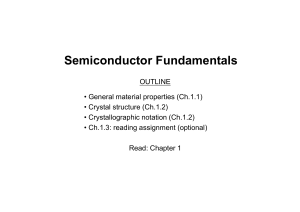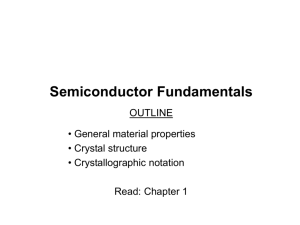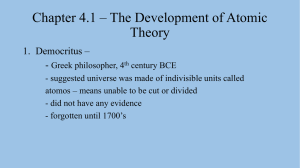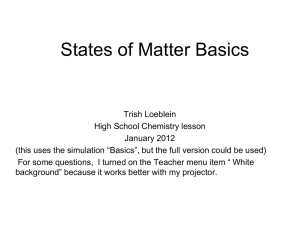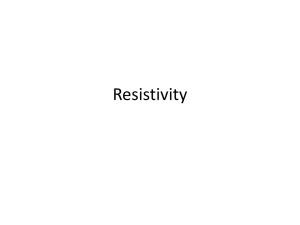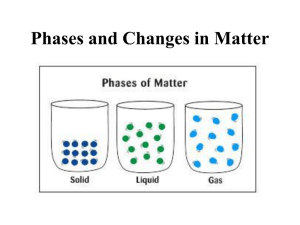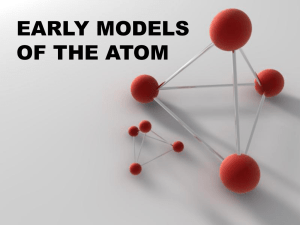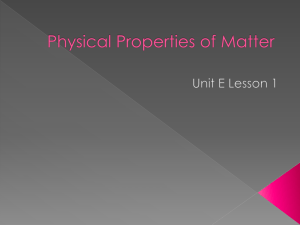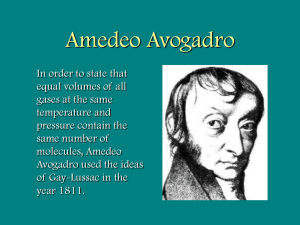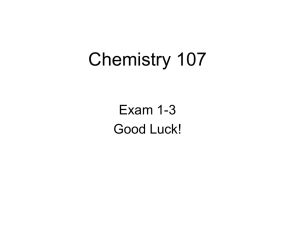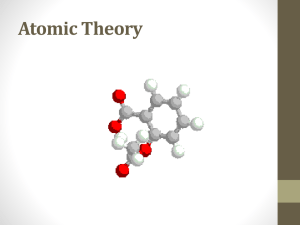What is a Semiconductor?
advertisement
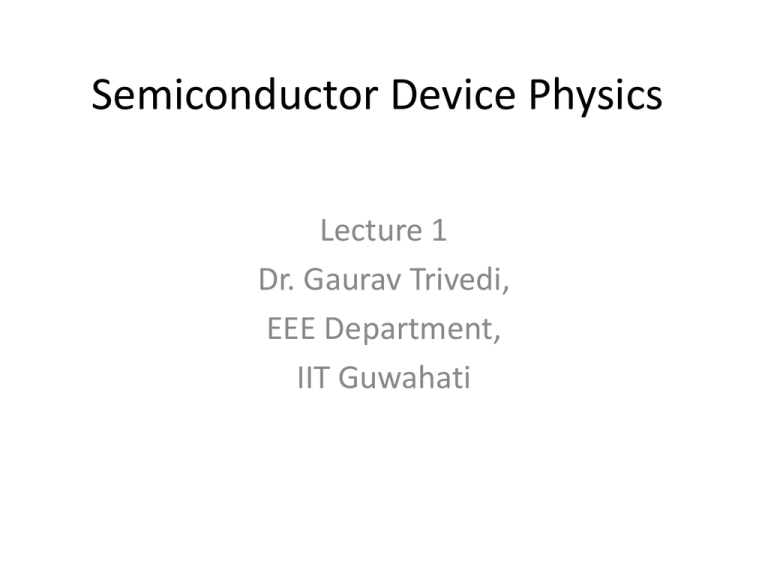
Semiconductor Device Physics
Lecture 1
Dr. Gaurav Trivedi,
EEE Department,
IIT Guwahati
What is a Semiconductor?
Low resistivity
“conductor”
High resistivity
“insulator”
Intermediate resistivity “semiconductor”
The conductivity (and at the same time the resistivity) of
semiconductors lie between that of conductors and insulators.
What is a Semiconductor?
Semiconductors are some of the purest solid materials in existence,
because any trace of impurity atoms called “dopants” can change the
electrical properties of semiconductors drastically.
Unintentional impurity level:
1 impurity atom per 109 semiconductor atom.
Intentional impurity ranging from 1 per 108 to 1 per 103.
No recognizable
long-range order
Completely ordered
in segments
Entire solid is made up of
atoms in an orderly
three- dimensional array
polycrystalline amorphous crystalline
Most devices fabricated today employ crystalline semiconductors.
Semiconductor Materials
Semiconductor Materials
Elemental:
Si, Ge, C
Compound: IV-IV SiC
III-V GaAs, GaN
II-VI CdSe
Alloy:
Si1-xGex
AlxGa1-xAs
From Hydrogen to Silicon
# of Electrons
1
2
3
Z Name 1s 2s 2p 3s 3p 3d
Notation
1
1H
1
1s
2 He
2
1s 2
3 Li
2
1
1s 2 2s 1
4 Be
2
2
1s 2 2s 2
5B
2
2
1
1s 2 2s 2 2p1
6C
2
2
2
1s 2 2s 2 2p2
7N
2
2
3
1s 2 2s 2 2p3
8O
2
2
4
1s 2 2s 2 2p4
9F
2
2
5
1s 2 2s 2 2p5
10 Ne
2
2
6
1s 2 2s 2 2p6
11 Na
2
2
6
1
1s 2 2s 2 2p6 3s 1
12 Mg
2
2
6
2
1s 2 2s 2 2p6 3s 2
13 Al
2
2
6
2
1
1s 2 2s 2 2p6 3s 2 3p1
14 Si
2
2
6
2
2
1s 2 2s 2 2p6 3s 2 3p2
15 P
2
2
6
2
3
1s 2 2s 2 2p6 3s 2 3p3
16 S
2
2
6
2
4
1s 2 2s 2 2p6 3s 2 3p4
17 Cl
2
2
6
2
5
1s 2 2s 2 2p6 3s 2 3p5
18 Ar
2
2
6
2
6
1s 2 2s 2 2p6 3s 2 3p6
The Silicon Atom
14 electrons occupying the first 3 energy levels:
1s, 2s, 2p orbitals are filled by 10 electrons.
3s, 3p orbitals filled by 4 electrons.
To minimize the overall energy, the 3s and 3p
orbitals hybridize to form four tetrahedral 3sp
orbital.
Each has one electron and is capable of
forming a bond with a neighboring atom.
The Si Crystal
• Each Si atom has 4 nearest
neighbors.
• Atom lattice constant
(length of the unit cell side)
–10m
° 1A=10
°
a = 5.431A,
• Each cell contains:
8 corner atoms
6 face atoms
4 interior atoms
“Diamond Lattice”
How Many Silicon Atoms per cm–3?
Number of atoms in a unit cell:
4 atoms completely inside cell
Each of the 8 atoms on corners are shared among 8 cells
count as 1 atom inside cell
Each of the 6 atoms on the faces are shared among 2 cells
count as 3 atoms inside cell
Total number inside the cell = 4 + 1 + 3 = 8
Cell volume = (.543 nm)3 = 1.6 x 10–22 cm3
Density of silicon atom
= (8 atoms) / (cell volume)
= 5 x 1022 atoms/cm3
Compound Semiconductors
“Zincblende” structure
III-V compound semiconductors: GaAs, GaP, GaN, etc.
Crystallographic Notation
Miller Indices
Notation
Interpretation
(hkl)
crystal plane
{hkl}
equivalent planes
[hkl]
crystal direction
<hkl>
equivalent directions
h: inverse x-intercept of plane
k: inverse y-intercept of plane
l: inverse z-intercept of plane
(h, k and l are reduced to 3
integers having the same
ratio.)
Crystallographic Planes
Crystallographic Planes
Crystallographic Planes of Si Wafers
Silicon wafers are usually cut along a {100} plane with a flat or notch
to orient the wafer during integrated-circuit fabrication.
The facing surface is polished and etched yielding mirror-like finish.
Crystal Growth Until Device Fabrication
Crystallographic Planes of Si
Unit cell:
View in <111> direction
View in <100> direction
View in <110> direction
